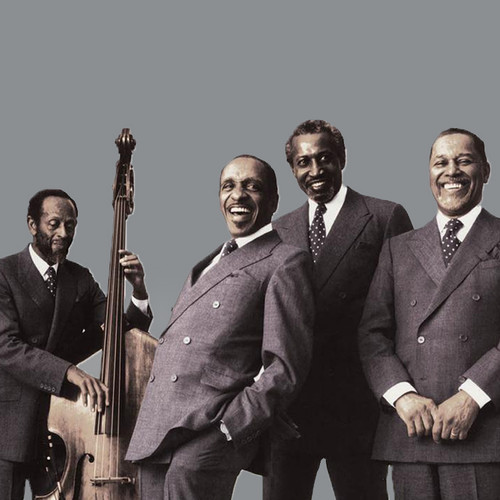
The Modern Jazz Quartet
Pianist John Lewis, vibraphonist Milt Jackson, bassist Ray Brown and drummer Kenny Clarke first came together as the rhythm section of the 1946 Dizzy Gillespie & His Orchestra and they had occasional features that gave the overworked brass players a well-deserved rest. They next came together in 1951, recording as the Milt Jackson Quartet. In 1952, with Percy Heath taking Browns place, the Modern Jazz Quartet (MJQ) became a permanent group. Other than Connie Kay succeeding Clarke in 1955, the bands personnel was set. In the early days Jackson and Lewis both were equally responsible for the groups musical direction but the pianist eventually took over as musical director. The MJQ has long displayed John Lewis musical vision, making jazz seem respectable by occasionally interacting with classical ensembles and playing concerts at prestigious venues, but always leaving plenty of space for bluesy and swinging improvising. Their repertoire, in addition to including veteran bop and swing pieces, introduced such originals as Lewis Django and Jacksons Bags Groove. The group recorded for Prestige (1952-55), Atlantic (1956-74), Verve (1957), United Artists (1959) and Apple (1967-69) and, in addition to the many quartet outings, they welcomed such guests as Jimmy Giuffre, Sonny Rollins, the Beaux Arts String Quartet, a symphony orchestra conducted by Gunther Schuller, singer Diahann Carroll (on one piece), Laurindo Almeida, a big band and the Swingle Singers. Although the musicians all had opportunities to pursue individual projects, in 1974 Milt Jackson, tired of the constant touring and the limitations set on his improvising and he quit the group, causing the MJQ to have a final tour and break up. In 1981 Jackson relented and the Modern Jazz Quartet (which has recorded further albums for Pablo and Atlantic) became active again although on a more part-time basis. Connie Kays health began to fade in the early 90s (Mickey Roker often filled in for him) and after his death in 1995, Albert Tootie Heath became his replacement.
